86 articles

On 3 October 2013, over 360 men, women and children drowned off the coast of Lampedusa attempting to enter Europe. The tragic event – one of many at the gates of Fortress Europe – made Italian president Giorgio Napolitano lament the “slaughter of innocents” and triggered a new European debate on laws, borders and human rights.
One year after the Lampedusa shipwreck, we continue this debate, drawing on the fact that Eurozine is a transnational network, representing views and experiences from all parts of Europe – and beyond. Indeed, this focal point accompanies the Eurozine conference 2014 in Conversano, Italy, entitled Law and Border – House Search in Fortress Europe.
The renewed focus on migrants landing on Europe’s Mediterranean shores has highlighted the difference of perspectives between southern and northern EU countries, which first surfaced with the economic crisis in 2008. Many southern frontier member states – Italy included – feel that they are being left alone to deal with the economic, legal and moral challenges that come with refugees and asylum seekers. At the same time, the tensions between western and eastern Europe have never left the agenda. Populist politics demonizes immigrants per se; the most recent occasion for xenophobic rhetoric being the lifting of work restrictions on Romanians and Bulgarians earlier this year. There is a fortress within the fortress.
In Fabrizio Gatti‘s account of another tragedy in the Mediterranean, it becomes painfully clear how the policy of the European Union, its laws and regulations, decides over life and death. According to Gatti’s estimate, at least 268 people drowned in the shipwreck of 11 October 2013 – just a week after the disaster that allegedly opened everyone’s eyes to the “slaughter of innocents” taking place in European waters. But the tragedy could have been avoided, writes Gatti, had the vessels in the vicinity been allowed to respond according to common sense. However, they were not. Referring to laws and regulations, Italian authorities passed the buck of responsibility to Malta.
At some point such policies will be interpreted in ethical terms. As Kenan Malik writes, “Fortress Europe has created not only a physical barrier around the continent but an emotional one, too, around Europe’s sense of humanity.”
Never have there been more refugees in the world as today: an estimated 45 million in total. Or more. At the end of September 2014, just before the Eurozine conference in Conversano, 130,000 Syrian refugees crossed the border to Turkey – in one weekend! Does increasing investment in surveillance – which has so far been the standard answer to such developments – really go to the core of the matter? More often than not, migrants have no choice but to flee conflict situations, poverty or environmental degradation. This fact will not go away. On the contrary, climate change and increased global inequality will only add to an already volatile situation. On the policy front, Eve Geddie argues that “increased securitization and discrimination against migrants has neither reinforced the freedom, security and wellbeing of EU citizens nor curbed irregular migration”, insisting that it’s time to change the European discourse on undocumented migrants. And confronted with these “new categories of human beings created by an international state system in turmoil” – refugees, asylees, IDPs (internally displaced persons), PRSs (those in a ‘protracted refugee situation’), stateless persons… – Seyla Benhabib calls for a “new conceptualization of the relationship between international law and emancipatory politics […] so as to create new vistas of the political.”
Weekly, we hear about refugees drowning on their way to Italian territory. In the 1990s, the refugees trying to reach Italy were mostly Albanian. Italian vessels tried to stop them – resulting in the sinking of the Kateri i Rades on 28 March 1997 and the death of 83 Albanians. Travelling in Albania in 2012, Alessandro Leogrande, author of a book about the tragedy, finds that nobody wants to be reminded of these events.
Several other articles in the focus contribute further to the complex, often epic narratives underlying immediate crisis situations. Historian Imke Sturm-Martin asks: why the reluctance to historicize the subject of migration? And Claus Leggewie argues that “migration should be seen not as a peripheral phenomenon but as central to Europe’s shared memory”. Leggewie refers to a range of case studies, from the millions of foreign workers deported from German-occupied Europe during World War II and used as forced labour, to the colonial roots of much of today’s so-called “illegal immigration”.
Finally, looking to the future, Slavenka Drakulic observes one kind of Europe being replaced by another. Italy is the perfect illustration of this. Instead of attempting to conserve the cultural past, we should accept that migration will adapt much of what we consider “European” to its own image.
But first read Lina Ekdahl‘s deceptively simple prose poem. Ekdahl captures the characteristic mix of genuine curiosity and interrogative hostility with which newcomers have been met throughout history and which is no less pertinent in the era of Dublin regulations. The absence of question marks makes the eternal questions – what do you really want, why are you here – even more unheimlich.
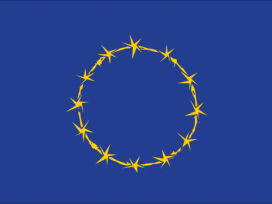

A borderless Europe may seem like a distant prospect at the moment. But as struggles for universal access to the global commons beyond the nation-state intensify, it is bound to become a necessity, say Ulrike Guérot and Robert Menasse.
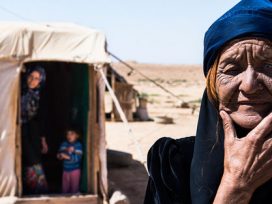
The intensified wave of migrants from the Middle East and North Africa is threatening to unravel the very foundations of European ideas of full citizenship, asylum and refuge, says Arjun Appadurai. But there must be a richer cultural road to legal and bureaucratic solutions currently being debated.
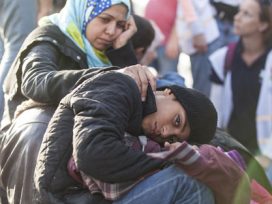
The twentieth century unleashed the spectre of statelessness into the world. Lyndsey Stonebridge explores how the modern history of refugees has shaped not only the lives of the stateless but also the lives, rights and securities of those who think of themselves as happily at home.

Hannah Arendt once remarked that the rights of man proved to be unenforceable in postwar Europe. Currently, observes Valeria Korablyova, the refugee crisis looks like proving the idea of Europe itself to be unenforceable. So what will remain if equality and solidarity finally fail to become the principles of cooperation between EU member states now riven by common fears?
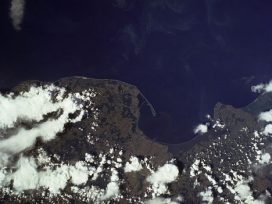
He and his family fled Iraq for Poland in the 1970s, never to return. Basil Kerski knows from firsthand experience that integration can be a long and difficult process, but it usually enriches receiving societies and new arrivals alike. As further migrations and intercultural encounters undoubtedly await Europe, Kerski argues in favour of European solidarity.
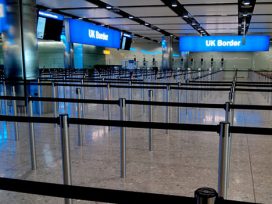
Today, bordering operates at all levels, writes Don Flynn: from the geopolitical bordering that expresses the changing balance of power between states; to the reconfiguration of state administrative procedures at the behest of economic and technological imperatives; to the experience of the border as it impacts on everyday lives.
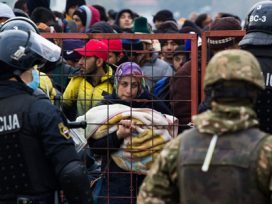
Eastern European states are expected to renounce their post-totalitarian victim status and re-gained national homogeneity in order to show solidarity with western Europe in the refugee question. No wonder that they resist, writes Slavenka Drakulic.
For decades the West has denied Africa access to western markets, writes economic historian Andrea Franc in an article first published in Schweizer Monat. Meanwhile, subsidized western agricultural surpluses have destroyed African economies. The human cost of this can now be seen along the full length of Europe’s southern shores.
Mass migration is not merely the result of geopolitical and economic factors, but of cultural triggers too. Moreover, says Ivaylo Ditchev, borders themselves must be subject to a public debate about what kind of borders we want where, rather than arbitrary decisions made by the powers that be.
The current crisis is generating the myth of borders as controlled, says Seyla Benhabib. But this is only a myth. It is a fact that states are escaping their obligations under international and European law; while migrants themselves may be helping to keep the social peace between classes.
Accommodate the current influx of refugees, or accept more suffering and tragedy, and risk a humanitarian disaster in the Balkans. The options could scarcely be clearer, says Jakub Patocka. But in the absence of a strong independent media in central and eastern Europe, the public debate has gone awry.
Freedom of movement was one of the major achievements of the revolutions of 1989, argues Jacques Rupnik. Now, central and eastern European heads of state refuse to grant this freedom to non-Europeans. But how much longer can they expect to maintain their contrary stance?
The hostile response of central and eastern European heads of state to the prospect of accepting Syrian refugees is emblematic of the parlous state of liberal democracy in the region, say Michal Simecka and Benjamin Tallis. Europe must avert a deepening East-West divide.
The European Union is willing to use costly police and military operations to suppress refugee mobility, write Mariagiulia Giuffré and Cathryn Costello. Which, in short, means responding to those fleeing war, repression and human rights abuses with more of the same. So what are the alternatives?
In an article first published prior to the 19 April capsizing of a wooden fishing boat and consequent drowning of around 800 migrants in the Mediterranean, Judith Sunderland and Bill Frelick warn about the EU’s preference for border enforcement over the creation of safe, legal channels into the EU.



